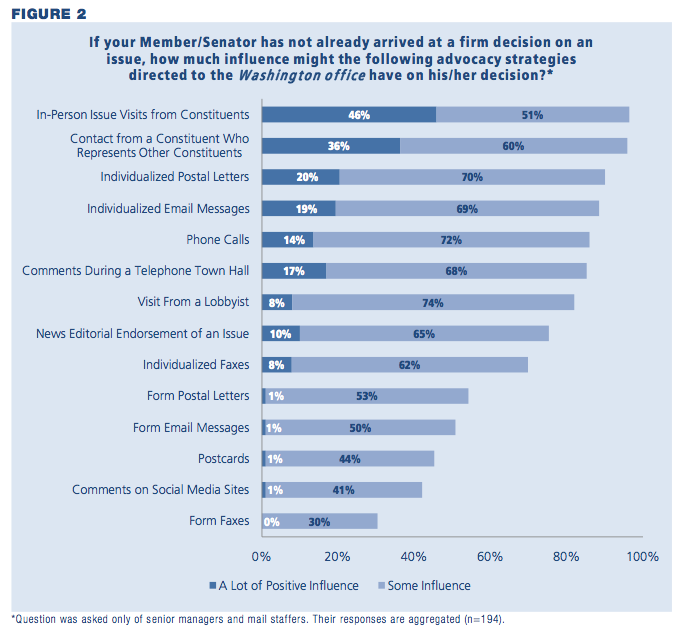 The Congressional Management Foundation just released their report, Communicating with Congress: Perception of Citizen Advocacy on Capitol Hill, which surveyed 260 congressional staff in October of 2010 about their opinions and practices on constituent communications including email and social media.
The Congressional Management Foundation just released their report, Communicating with Congress: Perception of Citizen Advocacy on Capitol Hill, which surveyed 260 congressional staff in October of 2010 about their opinions and practices on constituent communications including email and social media.
“Since the introduction of the Internet, maintaining that free flow has been a challenge both for Congress and citizens. Congressional offices are overwhelmed with the significant increase in volume and the diversity of delivery methods used by advocate organizations. On the other hand, citizens and the advocacy community have been frustrated by the myriad of technological tools utilized by offices to authenticate that actual constituents are sending messages, yet result in technological and 'user interface” obstacles to communications,' said the report.
Check out the Reports Key Findings:
Email Communications
- 87% of staffers thought email and the Internet have made it easier for constituents to become involved in public policy.
- Almost all (97%) felt electronic communications have increased the number of constituents who communicate with their offices.
- 57% felt email and the Internet have made Senators and Representatives more accountable to their constituents.
- 65% thought email and the Internet have reduced the quality of constituents’ messages.
- 41% thought that email and the Internet have increased citizens’ understanding of what goes on in Washington.
Face to Face Impacts Undecided Members
- 97% of staffers say constituent visits to the Washington office and to the district/state office (94%)
 have some or a lot of influence on an undecided Member.
have some or a lot of influence on an undecided Member. - 87% of staffers said questions at town hall meetings and letters to the editor (80%) have some or a lot of influence.
- Constituents who make the effort to personally communicate with their Senators and Representatives – except via fax – are more influential than lobbyists and news editors.
Content Trumps Channels
- Congressional staff says that they weigh email and postal mail the same but what matters most is the content, not the channel. 20% say that messages that are customized by constituents are much more influential than identical form messages.
- The report says that constituents can personalize their messages by discussing the impact of a bill on the state or district, providing the reasons they support or oppose the bill or issue, and providing a relevant personal story.
Advocacy Campaigns
- 35% agree that advocacy campaigns are good for democracy.
- 90% agree that responding to constituent communications is a high priority in their offices.
- Surprisingly, 53% of congressional staffers still believe that advocacy campaigns of identical form messages are sent without constituents’ knowledge or approval.
Social Media
- While social media as a listening and communications tools is gaining momentum among Congressional staffers, comments from social media applications have little influence on undecided Members, because Members cannot tell whether comments are made by their
constituents. - 64% of staffers think Facebook is an important way to understand constituents’ views and 74% think it is important for communicating their Members’ views.
- 42% of staffers say Twitter it is an important way to understand constituents’ views and 51% say it’s a good vehicle for their Members’ communications.
- 72% of staffers say YouTube is important for communicating their Members’ views.
Lessons Learned from the Study?
1. Encourage your constituents to personalize their messages when writing, emailing or calling your Members of Congress.
2. Social media as a listening and communications tool is gaining momentum on the Hill but public comments on Facebook, Twitter, etc are not necessarily influencing Members.
3. The constituent relationship management (CRM) vendor community needs to continue educating Members of Congress and their staff that constituent email as a result of advocacy campaigns (even if it’s form email) is not spam and that constituents sending these emails go through a formal sign up process and only sign petitions or emails that they support.



COMMENTS